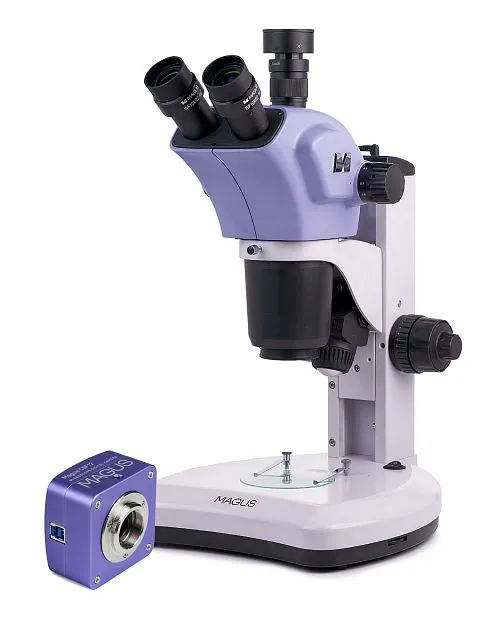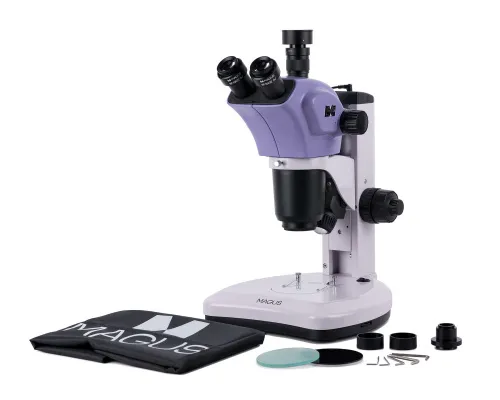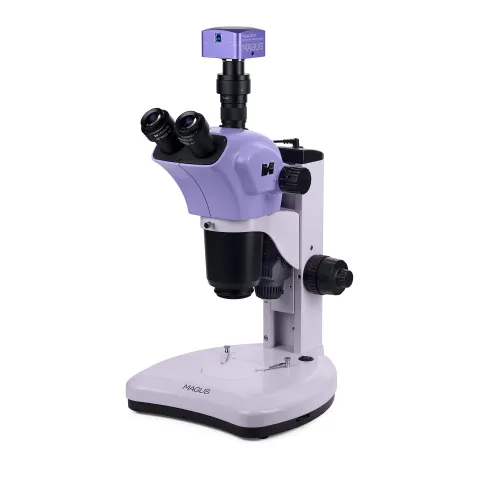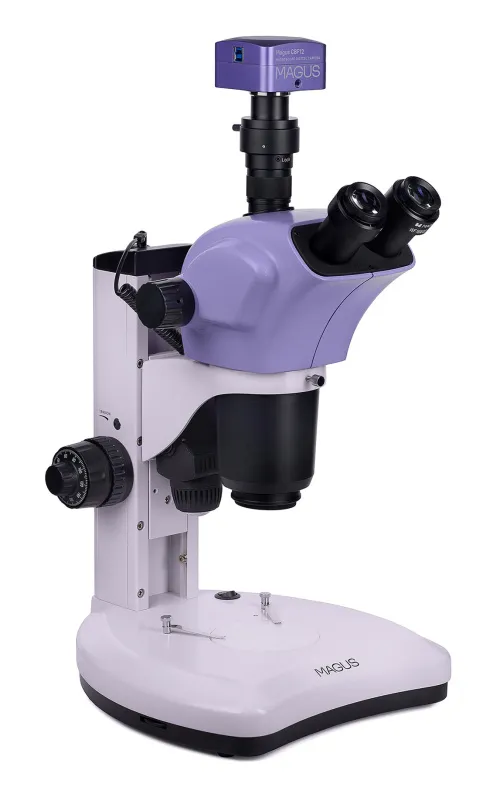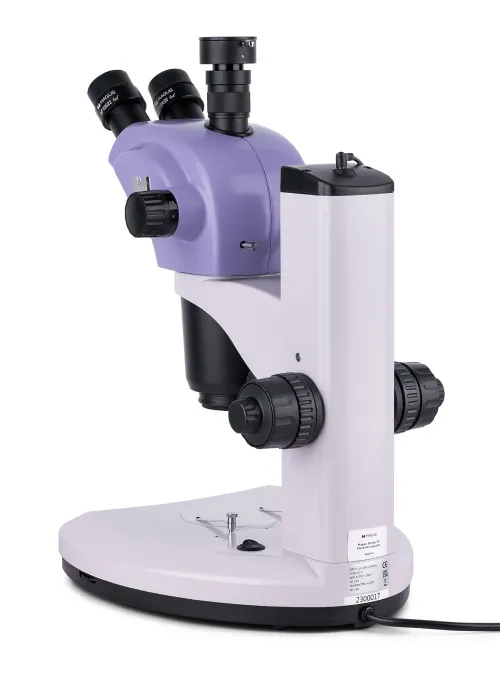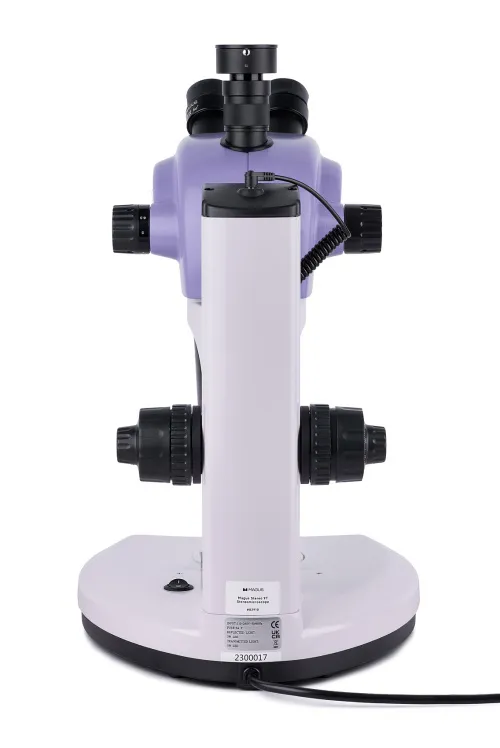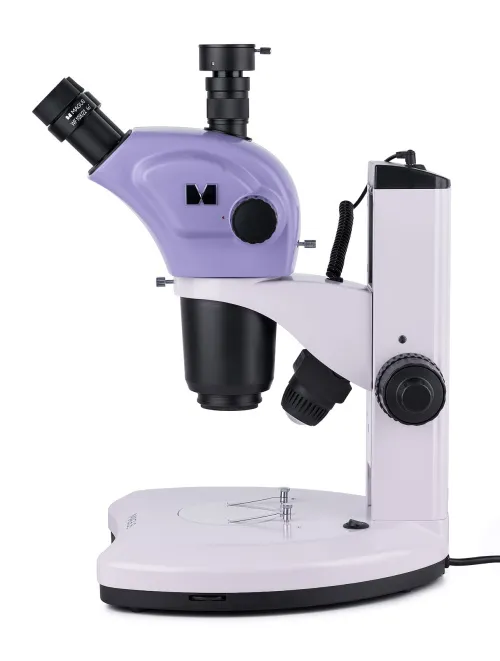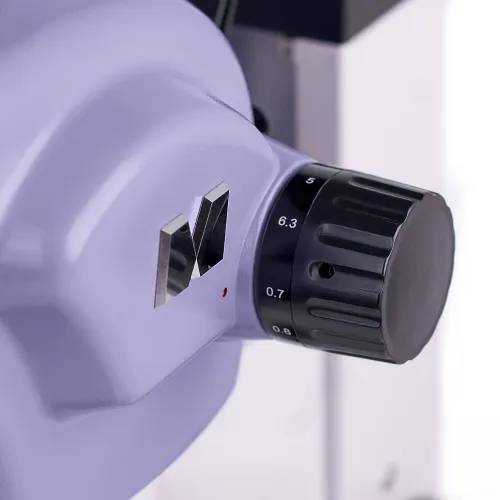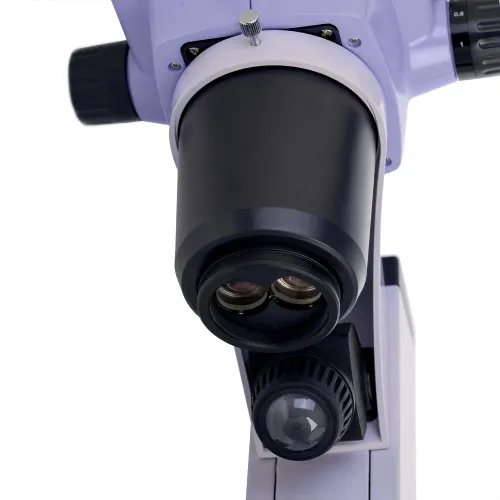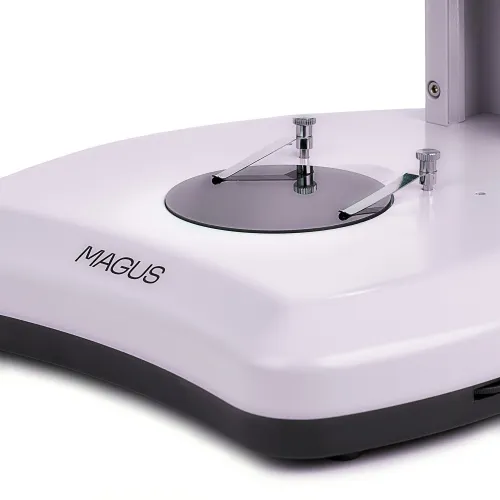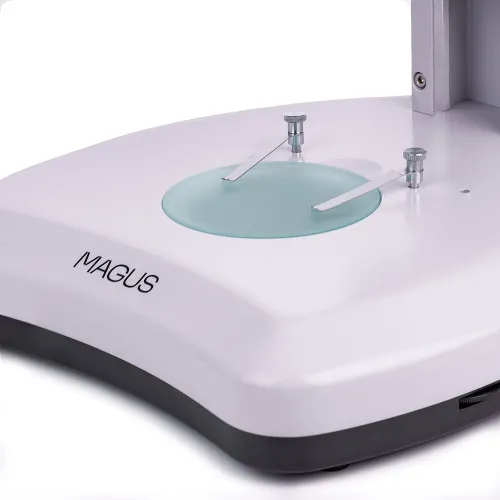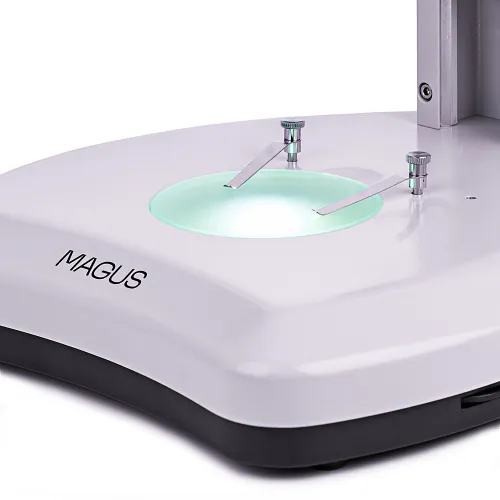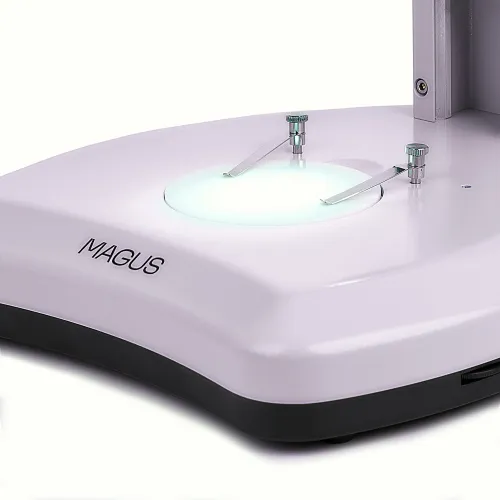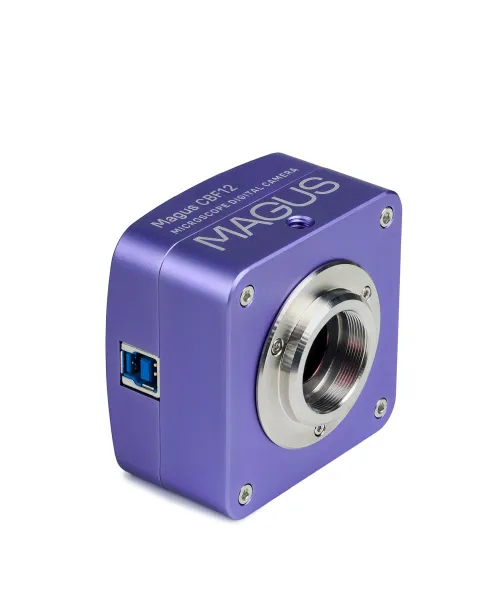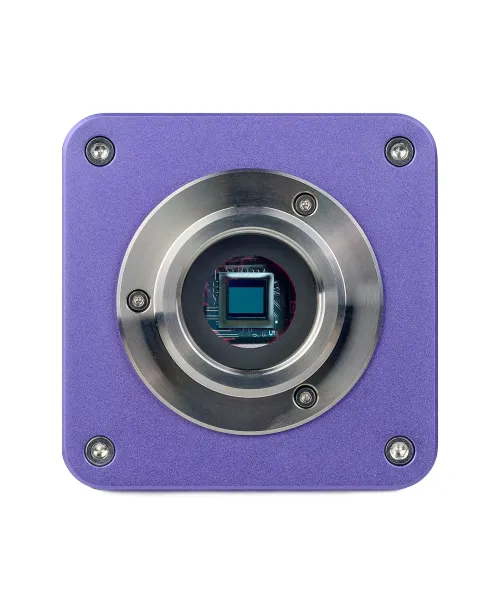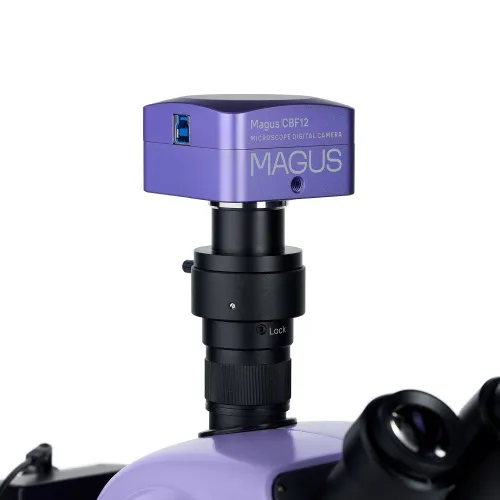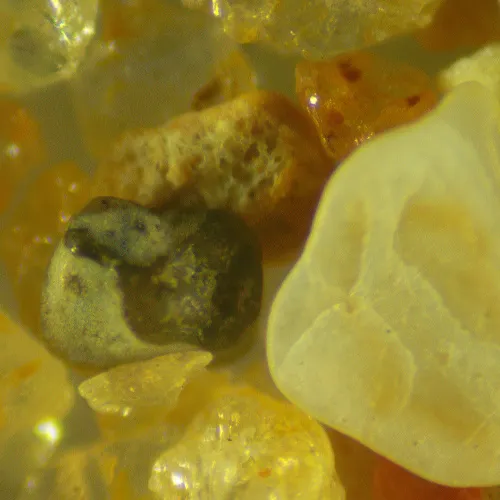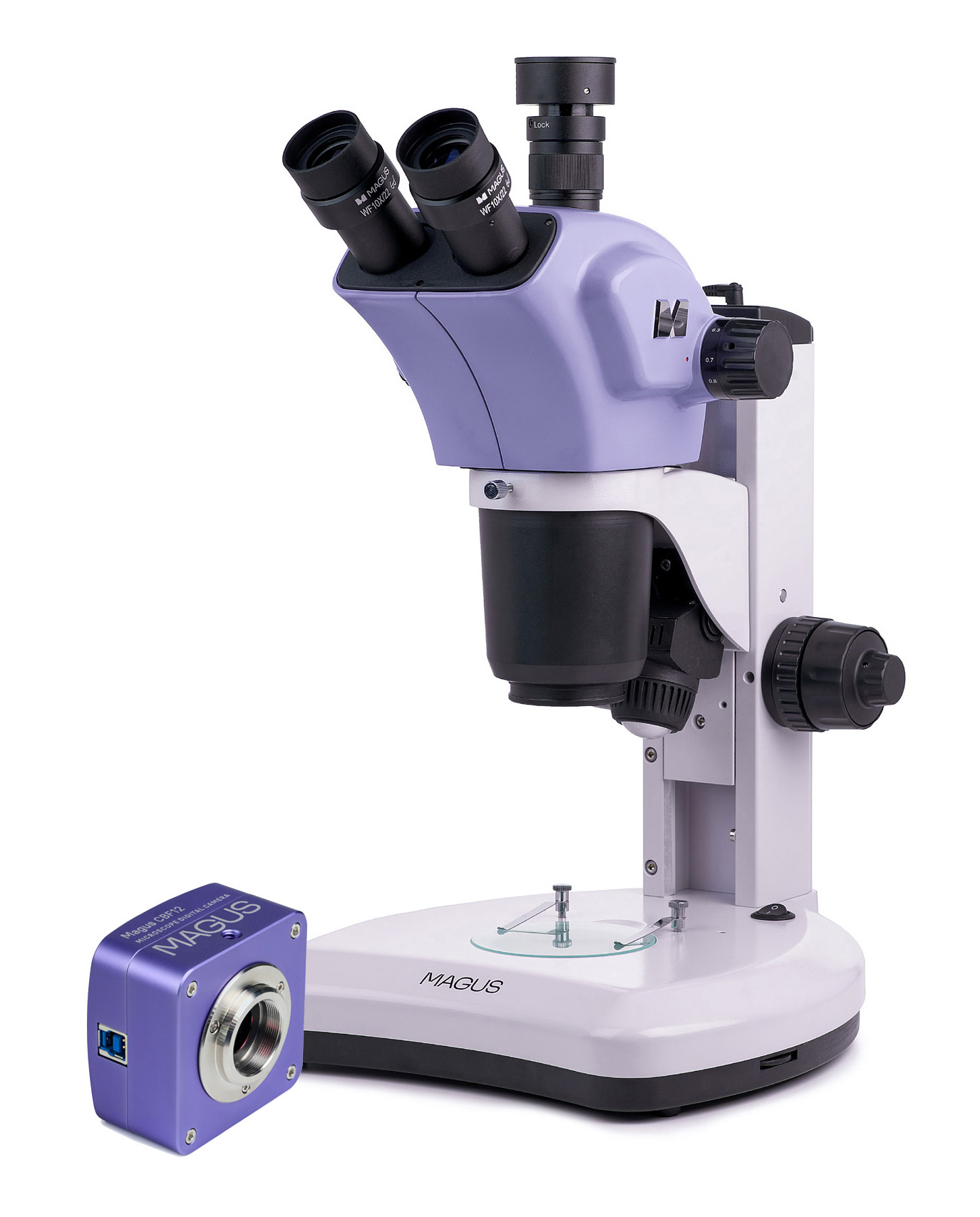MAGUS Stereo D9T Digital Stereomicroscope
With a camera. Magnification: 7–63x. The Greenough optical design. Trinocular head, LED transmitted light illuminator 5W, LED reflected light oblique illuminator 3W
| Product ID | 83044 |
| Brand | MAGUS |
| Warranty | 5 years |
| EAN | 5905555018577 |
| Package size (LxWxH) | 44x42x67 cm |
| Shipping Weight | 12.1 kg |
The MAGUS Stereo D9T Stereomicroscope forms a non-inverted three-dimensional image and has a large working distance. You can examine samples but also conduct experiments with them. The Greenough optical scheme produces images that are sharp and three-dimensional which is essential for high-precision observations. The microscope is equipped with a zoom lens and two illuminators (transmitted and reflected light) and can be optionally upgraded with additional accessories. Excellent choice for restoration, soldering, modeling, machinery service repair, and quality control.
Digital camera
The MAGUS CBF12 Digital Camera is designed to work together with a microscope: photographing, video recording, and displaying images on an external screen. Its characteristics are best suited for brightfield work on 4x and 10x flat-field microscope objectives and stereomicroscopes.
The MAGUS CBF12 camera is equipped with an Aptina CMOS sensor with a light sensitivity of 8.4 ke−/lux.sec. You can get the maximum field of view without distortion using an adapter with magnification 0.5x.
The 20MP sensor enables you to achieve a realistic and highly detailed picture with a resolution of 5120x3840px. In this mode, video is captured at 20fps. You can increase the frame rate and, as a result, improve the smoothness of the video by reducing the resolution. An available options: 2560x1920px (45fps). In any of the selected modes, adjusting the focus of the microscope is convenient. The modes with increased frame rates is suitable for studying moving objects and fast-flowing processes as well as for presentations and demonstrations.
Optics
The microscope has a trinocular head with a trinocular tube for mounting a camera. A C-mount adapter is included, but a digital camera must be purchased separately. The trinocular head rotates 360°. The zoom objective combined with a 10x eyepiece provides magnification from 7x to 63x. Thanks to the zoom lens, the magnification changes without reducing the focus. If you use auxiliary objectives (not included), you can change the magnification range, working distance, and field of view of the microscope. With optional accessories, the magnification of the microscope can be increased up to 315x.
Illumination
The working area is lit by two LED illuminators: 5W transmitted light illuminator and 3W reflected light (oblique) illuminator. Both illuminators are AC powered, bright, do not change color temperature when adjusting brightness, and have a 50,000-hour life.
Stage and focusing mechanism
One of the included plates is installed on the stage: double-sided black and white, white, or transparent. The first plate is used for observing opaque objects and makes the image high contrast. Dark-colored samples are examined on the white side, while light-colored samples - on the black side. White and transparent plates are used when you are observing translucent and transparent samples and want to achieve maximum brightness and uniform illumination of the working area.
The microscope has a coarse and fine focusing mechanism. Fine focusing is used at magnifications above 40x. Coarse focusing has tension adjustment.
Accessories
To extend the microscope’s capabilities, use additional accessories such as eyepieces, auxiliary lenses, calibration slides, and digital cameras. It is also possible to install a device for polarized light observations.
Key features of the microscope:
- Zoom objective with a zoom ratio of 9:1
- 360° rotation of the trinocular head, trinocular tube for photo and video shooting
- Greenough optical scheme, three-dimensional image with a large depth of field
- Transmitted and reflected (oblique) illumination, two durable LED illuminators
- Optional accessories to improve microscope performance
Key features of the camera:
- Aptina CMOS sensor with high light sensitivity
- 20MP sensor resolution: highly detailed images on low magnification objectives
- Frame rate sufficient for focus adjustment: 20fps with a resolution of 5120x3840px
- Classroom demonstrations and observing moving objects made simple, all thanks to increasing the frame rate while decreasing the resolution; movement of the sample is visible without jerking
- USB3.0 provides 10 times faster data transfer speeds than USB2.0
- Software for creating photos and videos as well as displaying and editing in real time
- Linear and angular measurements
The kit includes:
- MAGUS CBF12 Digital Camera (digital camera, USB cable, installation USB flash drive with drivers and software, user manual and warranty card)
- Base with integrated transmitted light source and power supply unit
- Stand with focusing mechanism
- Trinocular head
- Eyepiece 10x/22 mm (2 pcs.)
- Black-and-white stage plate
- White plate
- Transparent plate
- Reflected light oblique illuminator
- C-mount adapter
- AC power cord
- Dust cover
- User manual and warranty card
Available on request:
- 15x/15mm eyepiece (2 pcs.)
- 16x/15mm eyepiece (2 pcs.)
- 20x/12mm eyepiece (2 pcs.)
- 25x/9mm eyepiece (2 pcs.)
- Auxiliary objective 0.5x
- Auxiliary objective 2x
- Reflected ring light illuminator
- Polarization device
- Calibration slide
| Product ID | 83044 |
| Brand | MAGUS |
| Warranty | 5 years |
| EAN | 5905555018577 |
| Package size (LxWxH) | 44x42x67 cm |
| Shipping Weight | 12.1 kg |
| Type | digital, stereo/instrumental |
| Microscope head type | trinocular |
| Head | 360 ° rotatable |
| Head inclination angle | 45 ° |
| Magnification, x | 7 — 63 |
| Magnification, x (optional) | 3.5–315 |
| Zoom ratio | 9:1 |
| Eyepiece tube diameter, mm | 30 |
| Eyepieces | 10x/22mm, long eye relief (*optional: 15x/15mm, 16x/15mm, 20x/12mm, 25x/9mm) |
| Objectives | 0.7–6.3x (*optional: with 0.5x auxiliary objective: 0.35–3.15x; with 2x auxiliary objective: 1.4–12.6x) |
| Working distance, mm | 110 (with 0.5x auxiliary objective: 188; with 2x auxiliary objective: 40.4) |
| Interpupillary distance, mm | 53 — 75 |
| Field of view, mm | 31.43–3.49 (with 0.5x auxiliary objective: 62.85–6.98; with 2x auxiliary objective: 15.71–1.745), with a 10x eyepiece |
| Stage, mm | Ø90 |
| Stage features | black/white plate, transparent plate, white plate |
| Eyepiece diopter adjustment, diopters | ±5D on each eyepiece |
| Focus | coaxial, coarse (83mm, with coarse focusing tension adjustment) and fine (0.002mm) |
| Body | solid aluminum |
| Illumination | LED |
| Brightness adjustment | ✓ |
| Power supply | 220V/50Hz, AC network |
| Light source type | reflected light: oblique illuminator – 3W LED; transmitted light: 5W LED |
| Ability to connect additional equipment | polarization device |
| User level | experienced users, professionals |
| Assembly and installation difficulty level | complicated |
| Optical scheme | Greenough |
| Application | for applied research |
| Illumination location | dual |
| Research method | bright field |
| Pouch/case/bag in set | dust cover |
| Weight, kg | 8 |
| Dimensions, mm | 280x463x335 |
| Sensor | Aptina CMOS |
| Color/monochrome | color |
| Megapixels | 20 |
| Maximum resolution, pix | 5120x3840 (5K) |
| Sensor size | 1/1.8" (7.17x5.38mm) |
| Pixel size, μm | 1.4x1.4 |
| Interface connectors | USB 3.0 |
| Light sensitivity | 8.4 ke−/lux.sec |
| Exposure time | 0.02ms–15s |
| Video recording | ✓ |
| Video recording | yes |
| Frame rate, fps at resolution | 20@5120x3840, 45@2560x1920 |
| Active range, dB | 65.8 |
| Place of installation | trinocular tube, eyepiece tube instead of an eyepiece |
| Image format | *.jpg, *.bmp, *.png, *.tif |
| Video format | output: *.wmv, *.avi, *.h264 (Windows 8 and later), *h265 (Windows 10 and later) |
| Spectral range, nm | 380–650 (built-in IR filter) |
| Shutter type | ERS (electronic rolling shutter) |
| White balance | automatic, manual |
| Exposure control | automatic, manual |
| Software features | brightness, exposure time, image size |
| Software | MAGUS View |
| Output | 5Gb/s, USB 3.0 |
| System requirements | Windows 8/10/11 (32bit and 64bit), Mac OS X, Linux, up to 2.8GHz Intel Core 2 or higher, minimum 2GB RAM, USB 3.0 port, 17" or larger display |
| Mount type | C-mount |
| Camera power supply | DC current, 5 V, with the USB port of the PC |
| Camera operating temperature range, °С | -10...+50 |
| Operating humidity range, % | 30 — 80 |
and downloads
We have gathered answers to the most frequently asked questions to help you sort things out
Find out why studying eyes under a microscope is entertaining; how insects’ and arachnids’ eyes differ and what the best way is to observe such an interesting specimen
Read this review to learn how to observe human hair, what different hair looks like under a microscope and what magnification is required for observations
Learn what a numerical aperture is and how to choose a suitable objective lens for your microscope here
Learn what a spider looks like under microscope, when the best time is to take photos of it, how to study it properly at magnification and more interesting facts about observing insects and arachnids
This review for beginner explorers of the micro world introduces you to the optical, illuminating and mechanical parts of a microscope and their functions
Short article about Paramecium caudatum - a microorganism that is interesting to observe through any microscope

